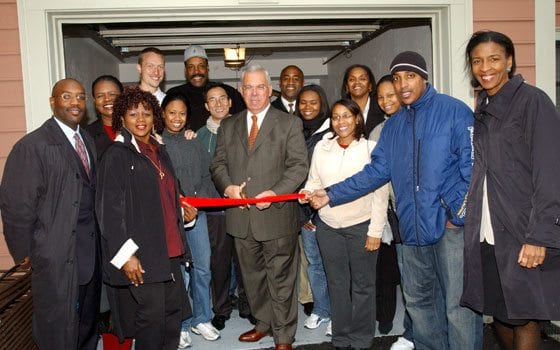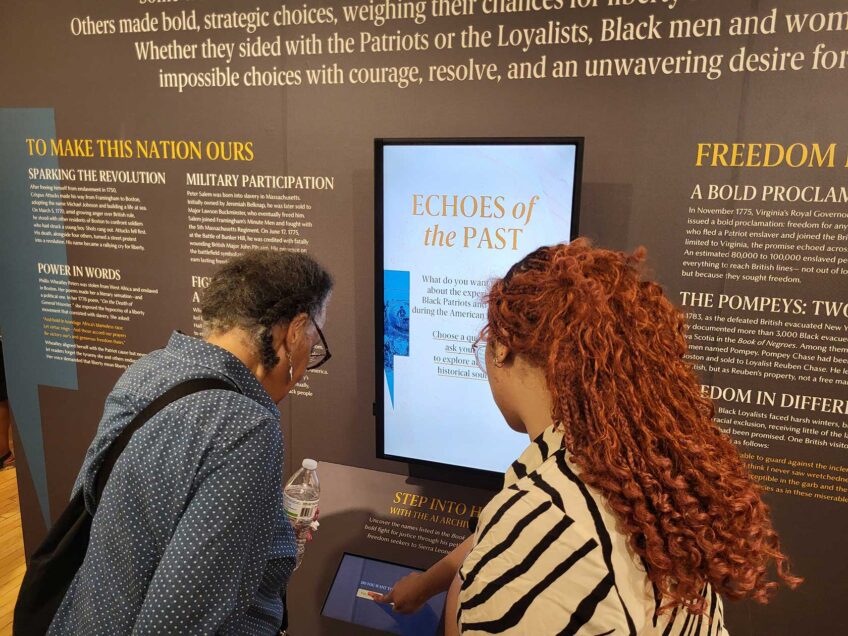

Roxbury-based Crosswinds Enterprises has quietly had an enormous impact on Boston neighborhoods by building quality housing and training construction workers for professional careers.
And there they were, the most unlikely of partners in the construction business, standing with Boston Mayor Thomas Menino near the corner of Martin Luther King Boulevard and Washington Street to cut a ribbon for the ceremonial opening of Washington Commons, a $13 million mixed income housing development in Roxbury.
For Arnold Johnson and George Chin, business partners since 1985, the Washington Commons development represented another mark in their growing list of achievements. Quietly, they have built Crosswinds Enterprises into a community-based company that prides itself on delivering quality services — one development at a time.
“For many companies it is strictly business,” Chin explained. “For us it is keeping the balance between our company’s success and the prosperity of the community we live and work in.”
From the very start, their goal was to make a difference in communities of color, not just in terms of its infrastructure but also its people. They have trained more than 100 people over the years, preparing them on basic carpentry skills to project management — and everything in between. During peak times, they will hire 20 full-time workers.
In the early days, the training programs were born out of necessity. As Arnold explained, they could find people who wanted to work. More difficult was finding workers who could meet their expectations for quality.
To meet that challenge, Crosswinds started offering after-work classes to employees and sub-contractors on obtaining construction licenses and various computer lessons.
The goal was clear. “We wanted to teach people to have careers, not just a job,” Arnold said.
They know from first-hand experiences the value of having a mentor and proper training. Because there weren’t too many people that they could ask questions, they were forced to learn the hard way — by making mistakes.
Arnold, a former basketball player at UMass-Amherst met Chin, a Chinese immigrant, while working on a construction project in Chinatown. They got to talking and before long, the two had teamed up as a joint-venture with Eddie Faria, a Cape Verdean man who has since left the company and moved to Atlanta.
They had little money, not many construction skills and very few opportunities. All of that changed over the years.
Arnold and Chin bonded quickly. “We both like to learn and we both like to share,” Chin said. “In all the years we have been together, we never had a problem. Everything I know I learned from Arnold. It all just came together.”
As owners of a small fledgling company, they learned another invaluable lesson — the ability to sacrifice their personal needs for the advancement of the company. Over the years, both of them voluntarily took pay cuts in order to maintain adequate cash flow and necessary bank balances for bonding requirements.
It’s been a long journey.
Arnold remembers the days when he and Chin would load up about 10 workers in the back of their used van and drive to various construction sites to finish projects. Back then, Arnold recalls, working on a $1 million project seemed like winning a billion-dollar lottery.
They had a tough road, especially in the 1990s during the housing recession. Part of the blame was on the economy; the other part was the perception of minority-owned construction companies. As Arnold explained, “The general perception was that minority-owned companies could not do the paperwork; didn’t know the state-of-the-art technology in construction; were fly-by-night companies and couldn’t deliver quality work.”
But Crosswinds changed some of those negative perceptions. “It took us many years to disprove all of the above and build a name recognition, a reputation,” Arnold says.
In the early days, they had mostly home improvement work. They then started bidding on city neighborhood construction contracts and slowly built a reputation for quality work. It was slow, but that is the way they wanted their company to grow — by slow incremental steps.
“We didn’t want to be a company that had high peaks and very low valleys,” Arnold said. “We wanted to have steady growth.”
And that they have. In recent years, they were the general contractors on the Brookview House III, a nearly 22,000 square foot development near the corner of Blue Hill Avenue and Fabyan Street in Dorchester. The $7 million project consisted of eight three-bedroom units and eight two-bedroom units, with community space located on the first floor and basement.
Crosswinds was also the general contractor for the $3 million Fenwick Gardens development near Dudley Square. That development eliminated most of the vacant lots near Magnolia and Alexander streets and consisted of eight duplex units, five single-family homes and one two-family home.
Four years ago, Crosswinds was the general contractor on the nearly $20 million Adams Court redevelopment near Mattapan Square. In addition to building 32 one-bedroom units, 13 two-bedroom units and 5 three-bedroom units, the project required updating most of the building’s mechanical, electrical and plumbing systems.
And more work is coming. Crosswinds is working on Bartlett Place, a development consisting of building 315 units of mixed income homes and 30,000 square feet of retail and commercial space on the grounds of the former MBTA site near Dudley Square.
“We set our expectations high from day one, and we started a small company like a big one with a detailed strategic plan with five- and 10-year goals,” Chin explained. “Our mission was not to make a lot of money but to see our people and community grow. It might take us a little longer but there will be much more joy in getting to that goal.”






